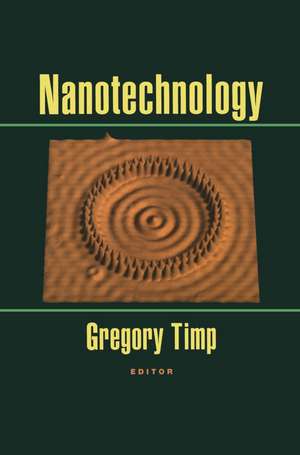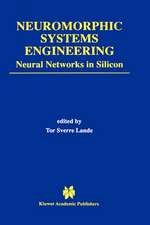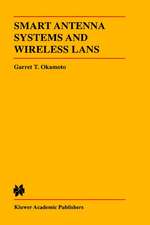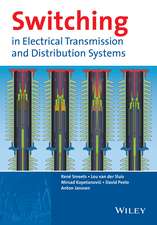Nanotechnology
Editat de Gregory L. Timpen Limba Engleză Paperback – 20 noi 2012
| Toate formatele și edițiile | Preț | Express |
|---|---|---|
| Paperback (1) | 1675.30 lei 6-8 săpt. | |
| Springer – 20 noi 2012 | 1675.30 lei 6-8 săpt. | |
| Hardback (1) | 1684.91 lei 6-8 săpt. | |
| Springer – 21 dec 1998 | 1684.91 lei 6-8 săpt. |
Preț: 1675.30 lei
Preț vechi: 2043.04 lei
-18% Nou
Puncte Express: 2513
Preț estimativ în valută:
320.61€ • 333.48$ • 264.68£
320.61€ • 333.48$ • 264.68£
Carte tipărită la comandă
Livrare economică 15-29 aprilie
Preluare comenzi: 021 569.72.76
Specificații
ISBN-13: 9781461268055
ISBN-10: 1461268052
Pagini: 712
Ilustrații: VIII, 700 p.
Dimensiuni: 155 x 235 x 37 mm
Greutate: 1.07 kg
Ediția:Softcover reprint of the original 1st ed. 1999
Editura: Springer
Colecția Springer
Locul publicării:New York, NY, United States
ISBN-10: 1461268052
Pagini: 712
Ilustrații: VIII, 700 p.
Dimensiuni: 155 x 235 x 37 mm
Greutate: 1.07 kg
Ediția:Softcover reprint of the original 1st ed. 1999
Editura: Springer
Colecția Springer
Locul publicării:New York, NY, United States
Public țintă
ResearchDescriere
Miniaturization has revolutionized human affairs by making possible inexpensive integrated electronic circuits comprised of devices and wires with sub-micrometer dimensions. These integrated circuits are now ubiquitous, controlling everything from our automobiles to our toasters. Continued miniaturization, beyond sub-micrometer dimensions, seems likely. And so we are compelled to explore science and technology on a new, yet smaller scale: the nanometer scale. This volume is a survey of the machinery and science of the nanometer scale. Its twenty-two contributing authors, drawn from many different disciplines including atomic physics, microelectronics, polymer chemistry, and bio-physics, delineate the course of current research and articulate a vision for the development of the nanometer frontiers in electronics, mechanics, chemistry, magnetics, materials, and biology. They reveal a world thirty years hence where motors are smaller than the diameter of a human hair; where single-celled organisms are programmed to fabricate materials with nanometer precision; where single atoms are used for computation, and where quantum chaos is the norm.Aimed at the level of comprehension of at least a junior- or senior-level undergraduate science (biology, chemistry, physics, or engineering) student, the book provides a survey of developments within the breadth of the nanotechnology field. The book is thus intended for both students and researchers in tunneling microscopy, polymer chemistry, bio-physics, atomic physics, electrical engineering, mechanical engineering, materials science, condensed matter physics, biology, lithography, and chaos. Mathematical derivations have been minimized, but not eliminted. The book contains many illustrations, some in color.
Cuprins
1. Introduction (G. Timp); 2. Nano-electronics for Advanced Computation and Communication (G. Timp, R.E. Howard, and P.M. Mankiewich); 3. Nanostructures in Motion: Micro-Instruments for Moving Nanometer-Scale Objects (N.C. MacDonald); 4. Limits of Conventional Lithography (D.M. Tennant); 5. Fabrication of Atomially Controlled Nanostructures and Their Device Application (H. Sakaki); 6. Chemical Approaches to Semiconductor Nanocrystals and Nanocrystal Materials (Louis Brus); 7. Nanotechnology in Carbon Materials (M.S. Dresselhaus, G. Dresselhaus, and R. Saito); 8. Self-Assembly and Self-Assembled Monolayers in Micro- and Nanofabrication (James L. Wilbur and George M. Whitesides); 9. Biocatalytic Synthesis of Polymers of Precisely Defined Structures (Timothy J. Deming, Vincent P. Conticello, and David A. Tirell); 10. Atom Optics: Uisng Light to Positron Atoms (Jabez J McClelland and Mara Prentiss); 11. From The Bottom Up: Building Things with Atoms (Don Eigler); 12. Physical Properties of Nanometer-Scale Magnets (David D. Awschalom and Stephan von Molnar; 13. Single-Electron Transport Through a Quantum Dot (Leo P. Kouwenhoven and Paul L. McEuen); 14. Chaos in Ballistic Nanostructures: Part I-Theory (Harold U. Baranger); Part II: Experiment (R.M. Westervelt); 15. Semiconducting and Superconducting Physics Devices in the InAs/AlSb Materials System (Herbert Kroemer and Evelyn Hu)
















